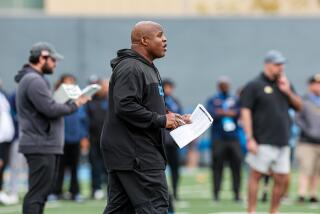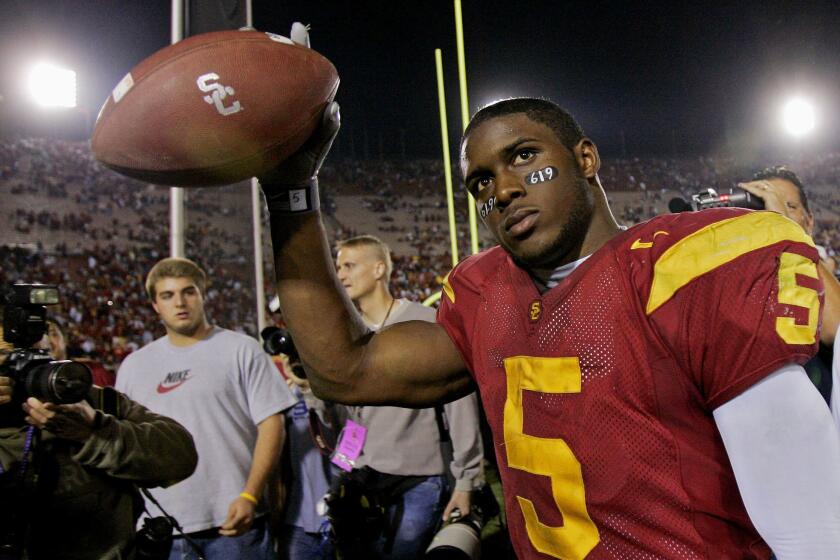Louisiana Tech and up-tempo offense: Change football can believe in
RUSTON, La. — The triggerman for the highest-scoring college offense this side of Oregon can’t be found anywhere in this week’s NCAA passing statistics.
Stephen Warner is built like a cinder block at 6 feet and nearly 300 pounds, and not one day in his life has he been confused for a Manning.
Warner will never be a Davey O’Brien or Johnny Unitas award candidate. His throwing motion might even put him on some “don’t watch” lists.
Warner is the starting center for Louisiana Tech, which would be leading the nation in scoring if not for Oregon’s hanging 62 points on USC.
The Bulldogs (8-1) are the Ducks without the reflector-mirror helmets and Phil Knight’s money. Oregon and Louisiana Tech are the only two teams in the Football Bowl Subdivision averaging more than 50 points per game this season.
What Louisiana Tech does differently from Oregon, or anyone else, is run its blender-on-puree offense through its center.
Oregon may utilize crazy sideline signboards no one understands, but the play-caller in Eugene never has to look at the field upside down.
“It’s something special, something different than what most people do,” Warner said.
The idea was baked around 2003 in something called the National Indoor Football League. Tony Franklin, Louisiana Tech’s offensive coordinator, was then coaching the Lexington Horsemen against the Ohio Valley Greyhounds in a bandbox road arena so loud even the horses needed earplugs.
Franklin decided to save his quarterback’s vocal cords by rerouting the plays. Instead of the quarterback screaming out the protection pickups — picture Peyton Manning’s pre-snap histrionics — the responsibility was moved to a centralized location.
The logic was simple: The center is closer to his offensive linemen than a quarterback in shotgun formation.
“The quarterback in our offense doesn’t have to speak,” Franklin explained. “To us, crowd noise is nothing. We laugh about it.”
At fast-moving Louisiana Tech, plays are signaled in between snaps as the Bulldogs hurry into formation. Warner handles all the protection schemes up front, then relays them via hand signals to quarterback Colby Cameron.
“It makes it really easy on the quarterback,” Cameron said. “I don’t have to worry about the protection.”
Cameron, a senior finance major, happily defers to Warner’s brain and vocal power. “He’s civil engineering,” Cameron said of his center’s major.
Warner is a former walk-on who literally walked over from Ruston High, right across the street.
Warner alters the snap count by using seven or eight code words during a game, and the system is working. Louisiana Tech has scored 50 or more points seven times.
Cameron, the younger brother of former USC receiver Jordan Cameron, has thrown 24 touchdown passes this season without an interception. But it’s tough keeping up with Oregon.
Louisiana Tech scored 51 against Texas San Antonio on Saturday and lost ground in the national scoring race. Oregon averages 54.33 points to Louisiana Tech’s 52.44.
The common denominator is tempo. “It’s a game changer,” third-year Louisiana Tech Coach Sonny Dykes said.
Dykes has long been a proponent of the spread formation, having apprenticed under Hal Mumme at Kentucky and Mike Leach at Texas Tech.
Mumme was so off-kilter at Kentucky, he went for it on fourth down for an entire season. Mumme and Leach were not up-tempo coaches, though, and neither was Dykes, who was hired as Louisiana Tech coach in 2010 after Derek Dooley left for Tennessee.
Dooley ran a pro-style offense, but Dykes was ready to flip the switch. He led some prolific offenses for Mike Stoops at Arizona, but his “game-changer” moment came when he hired Franklin.
Franklin’s fascination with up-tempo offense probably predates Chip Kelly’s at Oregon. Strange as it sounds, Franklin got the idea from former Alabama coach Mike DuBose.
Watching the 1999 Orange Bowl game between Michigan and Alabama, Franklin saw the Crimson Tide hand off to tailback Shaun Alexander four or five straight times without huddling. Michigan’s defense couldn’t keep pace.
“I thought to myself, ‘Holy mackerel, that’s genius,’” Franklin recalled of the sequence. “It might have been the only time in his life he did it.”
Franklin kicked his ideas around for years. Between jobs, he worked as a consultant and sold up-tempo offense to high school programs. Franklin took his act to indoor football in 2003 and then, in 2006, to Troy.
His epiphany came on a Friday night in 2007 when Troy and its up-tempo approach shocked Oklahoma State. Franklin: “We beat the living snot out of them.”
Tommy Tuberville hired Franklin to run Auburn’s offense in 2008 but fired him midway through his first season when the Tigers’ record sank to 4-2.
Franklin said old-line Southeastern Conference thinkers still consider his ideas “blasphemy.”
“I was the wrong guy, at the wrong time, at the wrong place,” he said.
Louisiana Tech was the right place.
Franklin says the up-tempo revolution will not be halted by a few resistant voices. Alabama Coach Nick Saban, commenting this season on West Virginia’s 70-63 win over Baylor, wondered, “Is this what we want football to be?” Saban even suggested up-tempo offenses may lead to more injuries.
“I totally disagree with what he said,” Franklin said.
Dykes and Franklin argue that only a handful of programs are able to recruit players who can successfully play Alabama’s smash-mouth style of football — most of them from the upper echelon of the SEC.
“In the South, it’s still considered a gimmick,” Dykes said of the up-tempo. “Good luck finding anyone that thinks Oregon is better than 11th in the SEC.”
Dykes and Franklin say Saban is protecting his team and working the officials in the event Alabama has to face Oregon in the Bowl Championship Series title game. The Louisiana Tech coaching staff is hoping Oregon gets that chance.
“It’s going to take Oregon winning the national championship to open people’s eyes,” Dykes said.
Alabama gets a dress rehearsal this week when Texas A&M; visits Tuscaloosa with quarterback Johnny Manziel, who originally committed to Oregon. The Aggies’ up-tempo offense has scored 63 points on Auburn and 58 on Arkansas.
Dykes and Franklin say it is insanity for teams with lesser talent to attempt to play trench football against bigger SEC schools. “If we played like they do, we would be taking our kids to slaughter,” Franklin said.
If the spread offense was an equalizer, the spread with tempo is an equalizer on uppers.
Louisiana Tech’s only loss this year was a 59-57 shootout against . . . Texas A&M.;
For what it’s worth, Florida, Arkansas, Louisiana State and Mississippi State have scored a combined 58 points against Texas A&M.;
Up-tempo is here to stay. Proponents fear only that blow back from powerful men like Saban might lead to rule changes designed to curb the enthusiasm.
Part of what makes up-tempo work is that defenses can substitute only if the offense substitutes.
Warner, from his center position, gets almost perverse satisfaction watching Louisiana Tech’s offense wear down opposing linemen. “You can feel it when it does happen,” he said. “You can feel the tired.”
Up-tempo advocates laugh when it is suggested Alabama is somehow disadvantaged by the current rules system. The Crimson Tide has won two of the last three BCS titles and is favored to win this season.
“His style has worked so long I don’t think he wants to have to change to adapt,” Warner said of Saban. “But the more and more people do it, the more he’s going to have to change. Because there’s more people on his schedule playing that way.”
Warner is thrilled to be at the center of all this attention.
Sometimes, though, late at night, he conjures scenarios where he goes all Ruston rogue and calls an audible for himself.
“Center 63 screen,” Warner said. “I just run out to the sideline and let the running backs block for me for a change. I hold the ball all of the time. Surely I could snatch on to it if someone tossed it to me.”
More to Read
Get our high school sports newsletter
Prep Rally is devoted to the SoCal high school sports experience, bringing you scores, stories and a behind-the-scenes look at what makes prep sports so popular.
You may occasionally receive promotional content from the Los Angeles Times.







